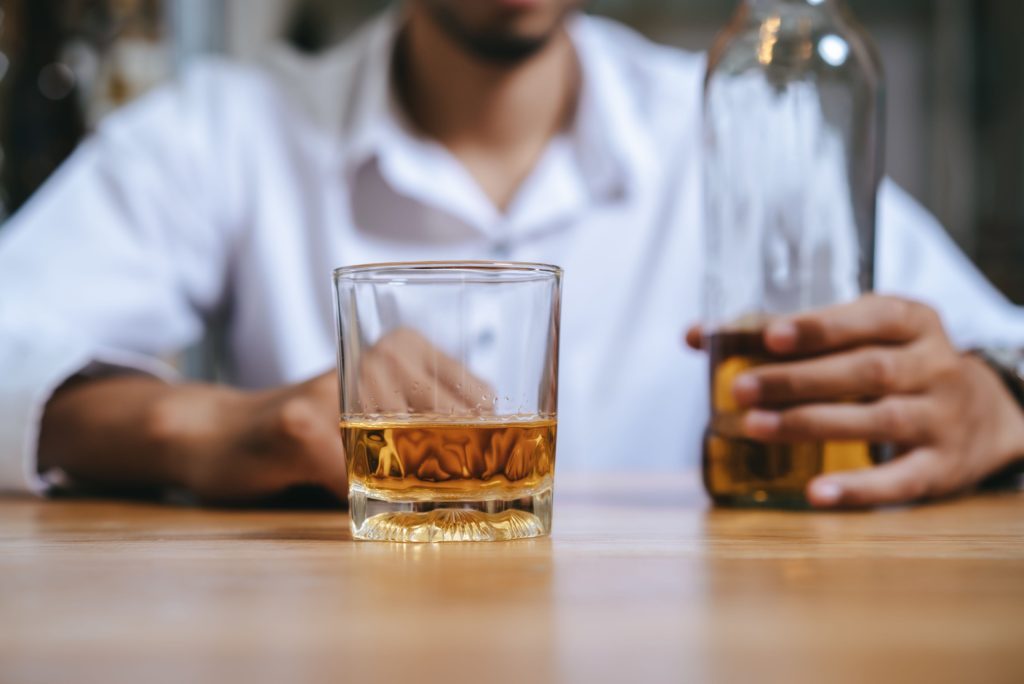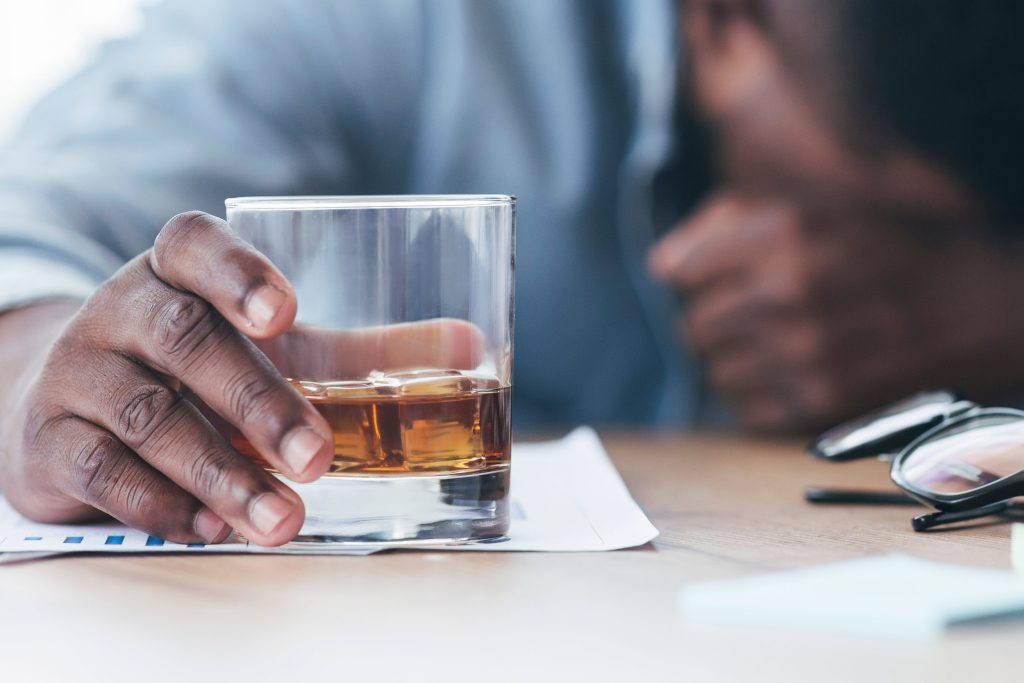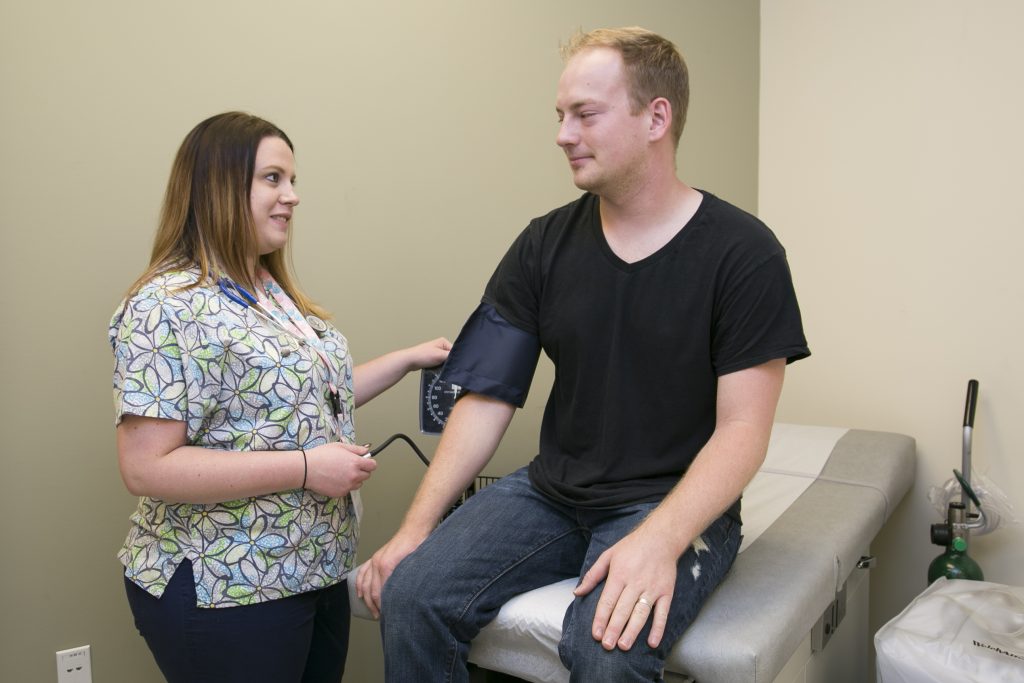Alcohol and Blood Sugar: Signs, Symptoms and Treatment

By The Recovery Village Columbus
Last Updated: February 15, 2023
Alcohol is unique in that it both raises and lowers blood sugar levels. The blood sugar response depends largely on the presence of food and whether you have diabetes or not.
Alcohol use impacts many important processes in the body, including how blood sugar is regulated. Alcohol can cause different effects on your blood sugar, depending on how much you drink and whether you have diabetes.
Diabetes is a condition that affects your blood sugar, or blood glucose, and is the seventh leading cause of death in Ohio and the U.S. People with diabetes are at a higher risk of experiencing alcohol’s adverse effects on blood sugar levels, but drinking can impact anybody’s blood sugar levels, regardless of whether they have diabetes.
Does Alcohol Raise Blood Sugar?
Alcohol is unique in that it both raises and lowers blood sugar levels. Because alcohol is high in calories and contains liquid sugars, it causes a temporary spike in blood sugar levels. This elevation in blood sugar, however, is short-lived as the sugars are absorbed quickly.
Does Alcohol Lower Blood Sugar?
While alcohol causes a temporary spike in blood sugars, the American Diabetes Association reports that the greatest risk of alcohol use in diabetics is hypoglycemia, or low blood glucose levels.
Hypoglycemia is caused by a combination of effects that alcohol has on the liver. Because the liver must work harder to metabolize alcohol, it will leave glucose-lowering medications in their active state for longer, making these medications’ effects stronger than usual. Alcohol also suppresses the release of sugars from the liver, contributing to lower blood sugar levels in anyone who drinks alcohol.
Ways Alcohol Can Affect Blood Sugar
An occasional drink or two may not have a big impact on your blood sugar. This is especially true if you’re having a drink with a meal. However, if you drink on an empty stomach or several hours after a meal, you are more likely to experience low blood sugar. The more you drink and the longer you drink, the more likely your blood sugar will react to the alcohol.
Depending on your body, your sugar may go up or down after you drink alcohol. In healthy individuals, the blood sugar response depends largely on the presence of food.
- When you’re eating: If you eat regular meals and drink heavily, hyperglycemia, or high blood sugar, can occur. When blood sugar levels are artificially elevated for prolonged periods of time, health problems may occur. Type 2 diabetes is of primary concern, and chronic heavy drinking increases the risk of this condition. One study showed that the link between drinking and developing diabetes was strongest in men who have more than six drinks per day. Another study showed that people with diabetes who had three to four drinks a day had higher fasting blood sugar levels than people without diabetes.
- When you’re fasting: If you regularly drink heavily without eating, your blood sugar levels can drop dangerously low. Severe hypoglycemia, or low blood sugar, can happen even if you do not have diabetes. When the body starts to fast, it breaks down glycogen, a substance that can be converted to sugar for the body to use as energy. However, after about 24 hours of fasting, the body’s glycogen is used up. When people are fasting but not drinking alcohol, their bodies can compensate for this by creating new sugar in the liver, a process called gluconeogenesis. However, when someone drinks regularly, their liver’s priority is to get rid of the alcohol. In this case, the liver does not make sugar to be used as energy, which can lead to critically low blood sugar.
FAQs
- What blood sugar levels are concerning? According to the Centers for Disease Control and Prevention (CDC), a blood sugar level of 70 mg/dL or lower is considered to be hypoglycemic. The CDC also says that a blood sugar greater than 240 mg/dL coupled with feeling ill can be an indicator of high blood sugar complications.
Drinking Alcohol With Diabetes
If you have diabetes, it is crucial to be careful about drinking. Heavy drinking in people with diabetes, especially type 1 diabetes, has been linked to issues such as:
- Problems with the body’s ability to use insulin
- Poor blood sugar control
- Higher rates of diabetic ketoacidosis, or DKA, a diabetic medical emergency that can be fatal
While it’s not necessary for people with type 1 diabetes to completely avoid alcohol consumption, it should be used carefully — people with diabetes should not drink on an empty stomach or drink heavy amounts of alcohol.
Overcome addiction with evidence-based, expert care.
Kidney Damage & Diabetic Nephropathy
According to Ohio State University, one in three cases of kidney disease is caused by complications of diabetes. Alcohol is known to affect your kidneys, inhibiting their ability to filter blood. Even if alcohol does not directly worsen diabetes symptoms, the combined effects of alcohol and diabetes on your kidneys can compound, significantly impacting kidney health.
Guidelines for Drinking Alcohol with High Blood Sugar
Ideally, those who have high blood sugar levels due to diabetes should not drink alcohol, or should at least limit their alcohol use to low amounts infrequently. Even when using alcohol safely, however, complications may occur.
Ultimately, if you have diabetes and are going to drink alcohol, make sure you’ve recently eaten, and avoid heavy amounts of alcohol. Monitor carefully for signs of hypoglycemia, such as weakness, sweating, shakiness, nervousness and a racing heartbeat.
FAQs
- Is it okay for diabetics to drink alcohol? Someone with diabetes can still drink alcohol, but there are multiple considerations that must be taken into account that may not necessarily affect those without diabetes.
- What happens if a diabetic drinks too much alcohol? The effects of drinking too much alcohol will vary, but it is possible that alcohol’s effects on the liver and on diabetes medications can combine to create life-threatening hypoglycemia.
- How can diabetes affect breath alcohol tests? According to Columbus defense attorneys, acetone in the breath of some diabetics may create falsely high alcohol breathalyzer readings. If combined with symptoms of low blood sugar, these false readings can create the impression of inebriation when the cause of the driver’s symptoms is actually related to diabetes.
How Blood Sugar Levels Impact Alcoholism Treatment
Blood sugar can impact your experience in alcohol detox and rehab. Doctors have found a link between higher blood sugar levels before treatment and lapses during treatment. Although doctors aren’t yet sure why this occurs, this connection further demonstrates the complicated relationship between alcohol and blood sugar, and emphasizes the need for professional rehab treatment for those with an alcohol use disorder and concurrent diabetes.
Top Reads About Alcohol Addiction

How Long Does Alcohol Stay In your System?
The time it takes for alcohol to have an effect depends on a variety of factors and will be… Read More

Alcohol Addiction Treatment in Ohio
If you can’t seem to stop drinking, you’re not alone. Let our experts help you heal… Read More

Am I an Alcoholic?
Knowing the signs of alcohol addiction can help you identify whether you or a loved one may be at… Read More

Does Alcohol Affect the Kidneys?
Alcohol causes dehydration, which decreases blood flow to the kidneys and makes it more difficult… Read More

Understanding Alcoholism and Finding Resources for Alcohol Addiction
This resource guide is an overview of the information currently available on alcohol use and abuse… Read More
Sources
- Ohio Department of Health. “Diabetes.” 2021. Accessed November 19, 2021.
- Bridges, Meagan. “Calorie count – Alcoholic beverages.” MedlinePlus, May 26, 2020. Accessed November 19, 2021.
- American Diabetes Association. “Alcohol & Diabetes.” 2021. Accessed November 19, 2021.
- Emanuele, Nicholas V.; Swade; Terrence F.; & Emanuele, Mary Ann. “Consequences of Alcohol Use in Diabetics.” Alcohol Health & Research World, 1998. Accessed November 19, 2021.
- White, Nicole D. “Alcohol Use in Young Adults With Type 1 Diabetes Mellitus.” American Journal of Lifestyle Medicine, November 2017. Accessed November 19, 2021.
- Wannamethee, S. G.; Shaper, A. G.; & et al. “Alcohol consumption and the incidence of type II diabetes.” Journal of Epidemiology and Community Health, 2002. Accessed November 19, 2021.
- Casale, Jarett. “Physiology, Fasting.” StatPearls, July 26, 2021. Accessed November 19, 2021.
- Centers for Disease Control and Prevention. “Manage Blood Sugar.” April 28, 2021. Accessed November 19, 2021.
- U.K. National Health Service. “Alcohol and drugs.” August 24, 2021. Accessed November 19, 2021.
- The Ohio State University. “Diabetic Nephropathy.” 2021. Accessed November 19, 2021.
- National Kidney Foundation. “Alcohol and Your Kidneys.” June 29, 2021. Accessed November 19, 2021.
- Owen, James. “How Can Diabetes Affect Breath Alcohol Tests?” Koenig & Owen. October 21, 2011. Accessed November 19, 2021.

Questions?
Our Recovery Advocates are ready to answer your questions about addiction treatment and help you start your recovery.

